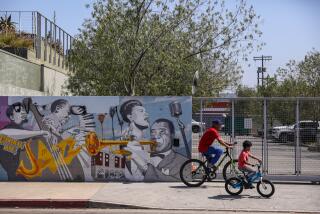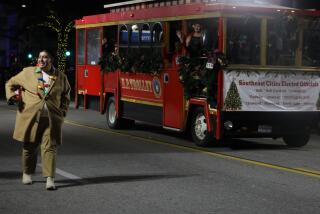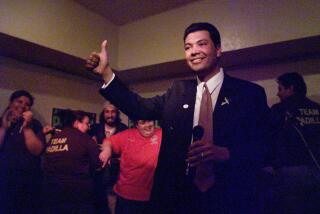Lott Campaigns to Segregate Himself From Extremist Group
- Share via
JACKSON, Miss. — In brochures, the Council of Conservative Citizens shows the face of classic conservatism, urging a bigger military and a smaller government.
But its Web site warns that blacks may “burn down your cities” and Third World immigrants are “bringing their inferior cultures.” The council publishes monographs too. One suggests that the United States be partitioned by race: the South to blacks, the Pacific Northwest to whites and the West Coast to Asian Americans.
The council claims 15,000 members nationally, including neo-Nazis from home and abroad--a fusion echoed in the stiff-armed salute to the Confederate flag that opens some of its meetings.
For the last decade, Senate Majority Leader Trent Lott (R-Miss.) maintained contact with the group by delivering convention speeches--in 1991, 1992 and 1995--and by welcoming top officials to his Washington office in 1997. Amid unfolding controversy, Lott has spent recent weeks dancing around details of his knowledge of the council and its extremist views.
Lott grew up with active council members, including his “favorite uncle,” Arnie Watson, and two cousins. He has relied on a national council leader to turn out Lott-for-Senate volunteers in northern Mississippi.
Bervil Watson, Uncle Arnie’s wife, said she believes her nephew was aware of the council’s mind-set all along. “He’s bound to have known the principles: being against black people. If nothing else, he got it from my husband.”
When news surfaced last month in the Washington Post that Lott had addressed the group, his press secretary said the senator had “no straightforward recollection,” although he may have appeared once while he served in the House from 1973 to 1989. When critics of extremist groups dug up more recent speaking dates, his spokesman said Lott had “no firsthand knowledge” of the group’s agenda. When newspaper columnists decried Lott’s council ties, his latest statement denounced “white supremacist and racist views espoused by this or any other organization,” giving no inkling of how much he knew.
Did Lott ever favor the sentiments put forward by the Council of Conservative Citizens? Was he using the organization, or was he used? He won’t say. Citing the time constraints of President Clinton’s impeachment trial, Lott’s press secretary, John Czwartacki, refused repeated interview requests.
Lott’s silence muddles a key part of the record: exactly how the Senate majority leader, among the most powerful politicians in the country, became linked to an organization fanning fear and hatred of minorities.
This much is clear: The Council of Conservative Citizens succeeded the old white Citizens Councils, which played a major role in thwarting civil rights advances during the 1960s by triggering state probes of interracial fraternizers, informing on plans to integrate churches and bus depots, and plotting how to stop them. The old councils were known as “the Klan in suits.”
The new council includes familiar faces from the original group, some of whom are well known to Lott. And the new group took advantage of Lott’s name and photo, generating publicity that helped it grow from a handful of old men bent on reliving their days defending Jim Crow.
Gordon Lee Baum, the council’s chief executive officer, denied the group is racist, describing it as “the opposite of the NAACP.” “[Race] is not our complete agenda, but we do speak out more than most conservative groups on issues that could be considered racial.” Lott understood, Baum added. “I would be shocked if he didn’t, at least generally.”
When Lott “spoke to these people in his home state, it gave them assurance that they’re being listened to, that their ideas are taken seriously,” Baum said.
The conferred legitimacy “is a scandal,” said Julian Bond, chairman of the National Assn. for the Advancement of Colored People.
“Unless he says loudly to them, ‘I violently disagree,’ by his presence [Lott] is endorsing the group,” Bond said. “He is speaking to the heirs of an organization that committed political and economic terror. . . . It’s analogous to speaking to a group of Nazis.”
Mississippi political observers say segregationist appeals are not needed to win office there. Their prime example: Lott’s fellow Mississippi senator and Republican, Thad Cochran.
In Lott’s native northern Mississippi, where the river delta gives way to rolling timberland, pockets of segregationist fervor still do flourish.
And, Lott told a local paper in 1996, “I got my values from my experiences with relatives in Carroll County.”
When he wasn’t hunting turtles, young Trent listened to front-porch family talk, often about race. Watson, the uncle, was a state senator and chaired the Carroll County Citizens Council. He helped start a whites-only school and urged his wife, who was a county farm extension agent, not to advise black growers.
At the University of Mississippi, Lott was president of fraternities in 1962, the same year James H. Meredith integrated the campus, setting off deadly riots. The Citizens Councils held a public anti-Meredith meeting attended by students and covered on the school paper’s front page.
After a year as a Pascagoula lawyer, Lott hired on with Democratic Rep. William Colmer, who was even more ardent than most segregationist politicians of the day. Colmer labeled civil rights bills “pernicious” and appeared in more Citizens Councils films than any other elected official.
In 1982, the Citizens Councils honored Lott in Carroll County, Jackson Clarion-Ledger columnist Bill Minor said.
Six years later, as the councils faded, some veterans met in Atlanta with kindred spirits for a fresh start under a new name: the Council of Conservative Citizens.
In 1992, Lott addressed a national meeting of the revamped group in Greenwood, a city near Carroll County. “The people in this room stand for the right principles and the right philosophy,” he said.
The council has hosted other noted speakers. Rep. Bob Barr (R-Ga.) delivered the national keynote in June in Charleston, S.C., and later repudiated opinions heard there. Gov. Kirk Fordice of Mississippi and former Gov. Guy Hunt of Alabama have given talks, the council newsletter says, as have columnist Joseph Sobran and cartoonist Michael P. Ramirez, then of the Memphis Commercial Appeal and now with the Los Angeles Times.
“I do vaguely remember speaking to a group with a name like that,” Ramirez said.
Lott’s council ties extend further, to his campaign network. William D. Lord Jr., a former Citizens Councils organizer, is the council’s national field representative and was Lott’s Carroll County co-chairman in 1994 during the senator’s last election campaign.
“The men from the council are the ones who knock on the neighbors’ doors” for Lott, Arnie Watson said. The council delayed one barbecue because it conflicted with a Lott fish fry in which “many of its members will be active,” its newspaper reported.
Meanwhile, the group touted Lott’s apparent support. For years, the council circulated flattering blurbs from Lott and other politicians to prospective speakers. Baum bragged about Lott in a British right-wing magazine--its distributor, a notorious neo-Fascist, became president of the council’s Washington chapter.
Lott’s press secretary, Czwartacki, said the council used Lott’s name without permission. Lord differs, recalling that Lott approved eight years ago quoting from a speech to the council.
Watson said Lott even belonged to the council. Czwartacki said Lott “never considered himself a member, even if his name shows up on a list somewhere.”
The Carroll County branch carries on the old council’s way. After the U.S. Supreme Court forced public school integration in 1954, the first group started the private Carroll Academy for whites.
The new council funds academy scholarships and fights improvements to the public system, where nearly all students are black, said county school Supt. Billy Joe Ferguson.
“The loudest one of all,” Ferguson said, “is Johnny Cecil Lott,” the senator’s cousin.
Watson, too, remains “hard on integration” faithfully attending council meetings despite the onset of Alzheimer’s disease, his wife said.
The new council also took on the Black Hawk political rally, a candidates’ showcase begun in 1975 that had the reputation, said former Mississippi Gov. William Winter, “of being an audience of segregationists.”
Winter, a Democrat, said he spoke there in its early days despite warnings that he’d be heckled. He said he confronted the members about their racial views.
With Lord as emcee, Lott headlined at Black Hawk in 1995. According to the council newspaper, he “received several ovations.”
Times researcher Tricia Ford contributed to this story.
More to Read
Get the L.A. Times Politics newsletter
Deeply reported insights into legislation, politics and policy from Sacramento, Washington and beyond. In your inbox twice per week.
You may occasionally receive promotional content from the Los Angeles Times.









